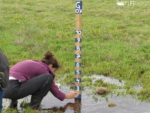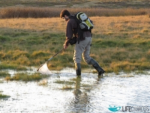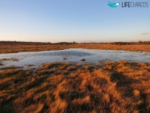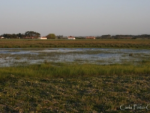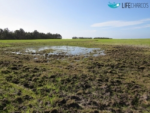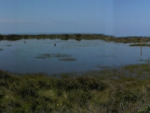Case study:LIFE Charcos - Conservação de Charcos Temporários na Costa Sudoeste de Portugal (Conservation of Med Temporary Ponds in SW Portugal): Difference between revisions
No edit summary |
No edit summary |
||
| Line 52: | Line 52: | ||
|Invasive species present=No | |Invasive species present=No | ||
}} | }} | ||
{{Project background}} | {{Project background | ||
|Project started=2013/07/01 | |||
|Project completed=2017/12/31 | |||
|Total1 cost=1977465 | |||
|Funding sources=LIFE PROGRAMME 1,483,098 Euro (= 75.00% of total eligible budget) | |||
}} | |||
{{Motivations}} | {{Motivations}} | ||
{{Measures}} | {{Measures}} | ||
Revision as of 10:31, 25 October 2019
This case study is pending approval by a RiverWiki administrator.
Project overview
| Status | Complete |
|---|---|
| Project web site | http://lifecharcos.lpn.pt/en/ |
| Themes | Environmental flows and water resources, Habitat and biodiversity, Monitoring |
| Country | Portugal |
| Main contact forename | Rita |
| Main contact surname | Alcazar |
| Main contact user ID | |
| Contact organisation | Liga para a Protecção da Natureza – LPN (Nature Protection League) |
| Contact organisation web site | http://www.lpn.pt |
| Partner organisations | |
| Parent multi-site project | |
| This is a parent project encompassing the following projects |
No |
Project summary
The Project LIFE CHARCOS aims to promote the conservation of a priority habitat – the Mediterranean Temporary Ponds (MTP) (priority habitat 3170* of the Annex I of EU Habitats Directive) - which is increasingly threatened due to its ecological fragility and by a lack of knowledge regarding its natural value. Moreover, in the last two-decades, land management options, such as modern industrialised agriculture and tourism have caused a steep decline in the condition of this habitat in the N2000 site.
This project involves a strong partnership that allies the experience in implementing concrete conservation management measures (LPN), scientific knowledge (UÉvora, UAlg and CCMAR) and local stakeholders dealing with land management (ABM and CMO), which will contribute decisively to the successful implementation of conservation actions.
The project consists in a well structured frame of actions that aims to tackle CTM conservation issues posed in the Costa do Sudoeste SCI. Preparatory actions will consolidate scientific knowledge as hidrogeological functioning (A3) and biological survey (A1). Compilation of this information and its integration in a GIS (A2) will support management decisions (actions B and C). The project intends to establish conservation status evaluation criteria (A4) and define CTM management guidelines (A5). The project team will work close with landowners (B1, B2), either for conservation and restoration of ponds (C2, C3), as well as, to promote extensive grazing and habitat connectivity (C1, C6). Seed bank is intended as a repository of native germoplasm (C4) to be used in the restoration actions of the project. Restoration actions will focus on restoring hydrology and hydroperiod, taking into account the basin topography. Removal of exotic and upland scrubby plant species will be done. The restoration of a
specific temporary pond will be devoted for public awareness (C5).
Monitoring surveys and results
Lessons learnt
Image gallery
|
Catchment and subcatchment
Site
Project background
Cost for project phases
Reasons for river restoration
Measures
MonitoringHydromorphological quality elements
Biological quality elements
Physico-chemical quality elements
Any other monitoring, e.g. social, economic
Monitoring documents
Additional documents and videos
Additional links and references
Supplementary InformationEdit Supplementary Information
| ||||||||||||||||||||||||||||||||||||||||||||||||||||||||||||||||||||||||||||||||||||||||||||||||||||||||||||||||||||||||||||||||||||||||||||||||||||||||||||||||||||||||||||||||||


